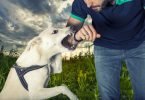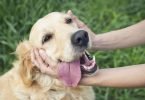Illness and old age affect dogs the same as it affects us, humans. As dogs grow older, their bones and muscles grow weaker. This impacts their motor control skills, sight, bowel movements, etc. It can be extremely disheartening to watch your beloved companion in discomfort. However, you can provide some much-needed comfort to your pet by learning more about common age-related ailments like bowel incontinence in dogs.
What is Bowel Incontinence in Dogs?
While bowel incontinence is a common problem in older dogs, it can affect younger dogs as well after a gastrointestinal problem. So, what is bowel incontinence? It simply refers to your dog’s inability to control its bowel movements as a direct result of weakened anal muscles.
Bowel incontinence if of two types.
- Nervous system-related like involuntary dribbling while coughing or barking. It can cause loss of contracture in muscle and reduced muscle tone and even result in paralysis.
- Non-nervous system-related bowel incontinence is usually a result of infection, trauma or fistulas.
Symptoms
Any of the following symptoms can indicate bowel incontinence in your dog:
- Defecating while sleeping or walking
- Reduced anal muscle tone
- Dragging hind legs on the floor
- Bloating
- Gas
- Diarrhea
Causes
Some of the most common causes of bowel incontinence in dogs are listed below.
- Muscle weakness as a result of old age
- Spinal tumor causing paralysis or pain in muscles
- A brain disease affecting the dog’s ability to control bladder functions.
- Prolonged diarrhea
- A chronic lesion in the dog’s anal area, also known as an anal fistula.
- Infection in the anal sac as a result of an injury
- Muscle wasting or atrophy
- IBD or inflammatory bowel disease
- Paralysis
Temporary bowel incontinence in dogs can also be seen in a post-surgery recovery phase. It is usually a result of anesthesia that relaxes the voluntary muscles of your dog’s body during and after surgery. This, however, is resolved within 2-3 days depending upon your pet’s urethral muscle strength.
Urinary incontinence can happen due to numerous causes ranging from arthritis to injuries or even excessive water intake. Fecal incontinence, on the other hand, is usually a result of the lower vertebral disease.
So, when should you be on the lookout for bowel incontinence in your pets? Well, if the incontinence is age-related, then it can show early signs as your dog enters middle age. However, this depends upon the breed of the dog. For instance, a 5-year old terrier will be considered a young dog, while a Great Dane will be entering middle-age at 5. Also, some breeds like Dobermans, cocker spaniels, and sheepdogs are at higher risk than others.
Diagnosis
If you spot any of the above-mentioned symptoms in your dog, then you should pay a visit to the veterinarian for a proper diagnosis. The vet will conduct a physical examination of the vital signs, auscultation, and palpitation. This will be followed by blood tests, urinalysis, and fecal examination. Additionally, a colonoscopy and endoscopy can provide the vet with a clearer look inside your pet’s system. The vet can also take MRI, CT scans, and abdominal x-rays to check for obstructions or any abnormalities.
Treatment
Instant relief treatments like medicines, warm water enema or fluid therapy can provide your canine with some comfort. However, it is very important to determine the actual cause of bowel incontinence to know the right treatment option. For instance, if the bowel incontinence is due to an infection, then the veterinarian will recommend a course of antibiotic medicines. However, if it is found to be a result of a parasitic infestation, then the right course will involve corticosteroids and antiparasitics.
Similarly, a spinal issue may be corrected by chiropractic care, whereas muscle-related problems can require surgery. Therefore, before embarking on a treatment plan, it is very important to discover the actual cause of bowel incontinence in your dog.
Treatment Methods
There are two common drugs used to treat dogs with bowel incontinence.
Phenylpropanolamine – helps strengthen and improve the contraction function incase of the urinary sphincter.
Diethylstilbestrol – this is a hormone replacement therapy mostly to manage the problem rather than provide a cure for it.
Nearly all dogs respond well to medications and therapies. However, it is important to combine the treatment that they receive in the clinic or through medications, along with management at home. The next section talks about what you can do to handle the situation while reducing your stress levels and making your dog feel loved at the same time.
How To Handle Bowel Incontinence in Your Dog?
Bowel incontinence essentially disrupts the motion regime of your dog. But, it can be managed by making simple changes to your daily routine and using precautionary products. For instance, make sure that you take your pet out for a pee more frequently than you do now. Also, avoid high-intensity exercise or a strenuous workout for your dog. Excessive exercise causes fatigue which can loosen up muscles leading to accidents in dogs who suffer from bowel incontinence.
You can also use a waterproof bed cover to protect your furniture and beds and manage accidental leakages effectively. Although, the best way to handle bowel incontinence is with proper protective clothing. Pet diapers are the most convenient products for handling your dog’s leakage accidents while at home or on walks. They offer extra help to dogs of all age groups.
Top 5 Dog Diapers
Pet Magasin Reusable
These eco-friendly reusable diapers are the best product that you can find for your dog with bowel incontinence. They are built using durable materials. The diaper is tightly gathered to prevent leaks in case of heavy accidents. This product comes with cute neon colors that make it easy to spot your pet even at night.
Pros
- Sturdy material
- Waterproof outer layer
- Easy to walk in
Cons
- Non-disposable
- Higher priced than other products in this category
Wegreeco
Like the Magasin diapers, the Wegreeco products too, are reusable and come in a variety of colors. These are good for handling bowel incontinence issues and preventing accidents. While the product is capable of absorbing and locking in wetness, it may not hold up well in case of heavy accidents.
Pros
- Machine washable
- Comfortable to wear
- Comes in different sizes
Cons
- Not entirely waterproof
- Non-disposable
Paw Inspired Ultra Protection
These are one of the best disposable pet diapers available in the market today. These are ideal if your pet is advancing in years and bowel incontinence is a regular issue. While reusable diapers are environment-friendly, they can be hard to clean and maintain. The Paw Inspired Ultra Protection diapers fit snugly on your pet keeping the floor dry and clean.
Pros
- Disposable and easy to clean.
- The diaper fasteners do not stick to your dog’s fur.
- Leak-proof edges
Cons
- Not environment-friendly
- More expensive than reusable diapers
Vet’s Best Comfort
These disposable diapers are specifically designed to prevent any accidents pertaining to urinary incontinence in your aging pet. Interestingly, these diapers come with a wetness indicator that changes color in case the dog needs change. This helps prevent leakages and overflowing.
Pros
- Designed for dogs of all ages
- Disposable for convenience
- Comes with wetness indicator
Cons
- Weak tape stickiness
- Not meant for very heavy flows.
Out! Disposable Wraps
These disposable wraps are highly absorbent and are perfect if you are traveling with your dog or going on a long journey. Apart from being leak-proof, the diaper wraps also come with fur-safe fasteners.
Pros
- Good Leak protection
- Color-changing wetness indicator
- Easy to put on and change
Cons
- May shift out of place
- Not suitable for female dogs
Natural Remedies for Bowel Incontinence
While preventive measures (diaper and wraps) along with conventional medication can provide some respite to both the owner and the dog, there are numerous natural remedies available for bowel incontinence in dogs. These are easily available and come without any side-effects. In fact, most clinics encourage pet owners to adopt these methods before deciding on drastic measures for their old dogs with bowel incontinence.
Diet
You will be surprised by how a few changes in your pet’s diet can improve its bowel control. Studies have found that by including fat and high-quality protein in your pet’s diet, can improve its muscle and joint control.
Normally, as dogs grow older, we tend to cut down on fat and protein in their food intake. Over a period of time, this can affect the strength in the dog’s pelvic muscle and sphincter, resulting in weak joints and poor muscle control. Therefore, by incorporating the right amount of fat, protein, and collagen in your pet’s diet you can ensure a much healthier lifestyle for your companion. Include items like chicken feet, bone broth, whole sardines, pig feet, etc.
Acupuncture
Acupuncture, chiropractic, and osteopathy can be used to improve and support the spinal cord and the central nervous system. This is especially helpful if your dog’s bowel incontinence is a result of an injury or poor training habits. These treatments can help you realign the functions properly.
Homeopathy
Using natural homeopathic remedies regularly has proven to be beneficial for bowel incontinence in pets. For instance, if your pet suffers from bowel incontinence due to a spinal cord or a nerve injury, then taking a couple of doses of Phosphoric acid 200C consistently over 3-5 days can help reduce the problem.
Amino acids
An increase in amino acid intake in your pet can also improve bowel control and help with the overall illness. You can include a supplement like phytoplankton to up the amino acid intake.
Herbs and Nutraceuticals
More specifically, marshmallow root and N-Acetyl Glucosamine are known to soothe your dog’s bladder wall and reduce bowel incontinence.
Apart from these, feeding your dog natural glandular support products can be helpful. These can include fresh glands like sheep, cow, or goat uterus or udders. Some companies make glandular supplements in case you can’t source fresh products. Recent studies have also shown the ailing dog’s conditions to improve with a non-synthetic hormone replacement therapy. Of course, it is highly recommended that you consult the veterinarian before embarking on any of the remedies listed here. A professional opinion will help you with better and correct implementations of these for the benefit of your pet.
Can I Prevent Bowel Incontinence In My Dog?
Prevention is always better than cure. However, there is no guarantee that your dog will not be affected by bowel incontinence in old age. Also, there is no harm in taking the right steps now to improve your dog’s condition so that they enter old age with a healthy and fit body. Plenty of studies have indicated that the best way to prevent health-related problems is to ensure that your pet leads a good life.
This can include
- A well-balanced diet
- Inclusion of digestive enzymes, probiotics, amino acids, antioxidants, and healthy fats.
- Avoiding synthetic and chemical products. For example, switching over to natural pest control for your dog.
- Consulting the right veterinarian can give you a holistic picture rather than recommending therapies that have no benefit for your dog.
- Exercise your dog adequately and have fun without over-exerting.
Conclusion
As a dog owner, you should be tuned in to your pet’s emotional and physical requirements as it deals with bowel incontinence issues. Our pets go through multiple changes as they grow older, and they can often feel ‘embarrassed’ by bowel accidents. It is at times like these that they require your support to help improve their situation. Therefore, before you go ahead and make any changes to your pet’s regime or begin medication, you must consult your veterinarian. Be sure of what you are dealing with before deciding on a treatment. For all you know, it might not turn out to be a very serious situation and may be cured with natural remedies or few dietary changes.






